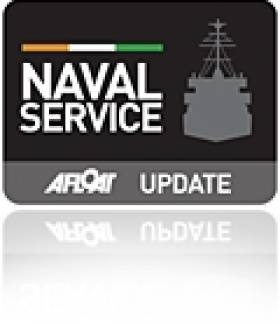Displaying items by tag: Emer sold to Nigerian
L.E. Emer Sold to Nigerian for €320,000
#EmerSOLD– A Nigerian company director has brought the former Irish Naval Service OPV L.E. Emer (P21) at auction for €320,000 reports RTE News.
The new owner has yet to decide whether to convert it for pleasure use or use it as a commercial security ship off west Africa. There were two other bidders, one from Cork and the other based in the UK.
Afloat.ie adds that the public auction was organized by auctioneer Dominic J. Daly at the Carrigaline Court Hotel outside Cork City.
The 1978 built 1,019.5 displacement tonnes offshore patrol vessel was last month officially decommissioned following a ceremony held in Cork City quays attended by Flag Officer Commanding the Naval Service Cmdr. Mark Mellett.
She subsequently returned to the Naval Service basin on Haulbowline Island where she was made open for inspection by potential buyers.
Her final patrol having taken place in late September which took in farewell calls among them to Dublin Port and a special cruise for former crew.
A pair of Pielstick 6-cylinder Diesels powered the ship over a distance of approximately 518,000 miles during the course of a career spanning 35 years.
According to the auctioneer, L.E. Emer's nearest sister L.E. Aoife (P22) which was completed only two years later and also launched at Verolme Cork Dockyard (V.C.D.) is to be put on the market in a year's time.
The design origins of L.E. Emer derive from the Naval Service's first custom-built vessel the L.E. Deirdre also launched from the V.C.D. shipyard in 1972 at Rusbrooke near Cobh. She was decommissioned in 2001 and sold for €190,000 and converted into a luxury yacht.
This will eventually leave the final 'Emer' class member L.E. Aisling (P23) to remain in the current seven-strong fleet. A pair of replacement newbuilds of the enhanced 'Roisin' or PV90 class are on contract from Babcock Marine.
The first newbuild L.E. Samuel Beckett (to be floated-out next month) in Appledore, north Devon is to be delivered early next year. Her sister L.E. James Joyce is scheduled to enter a year later in early 2015.





























































